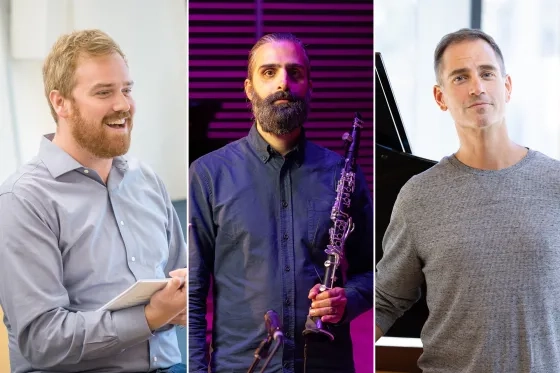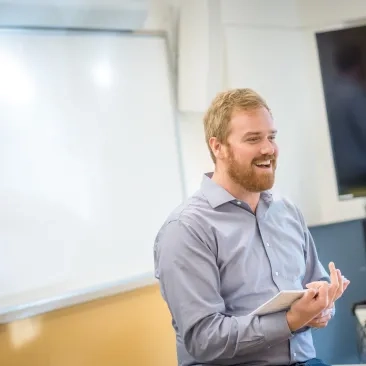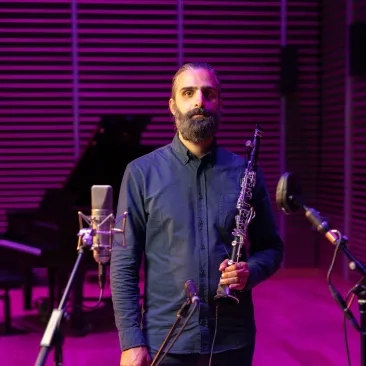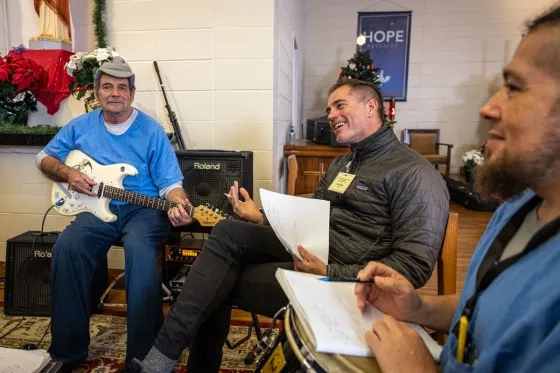SFCM's 2024 Winter Term: DND, Wine Tasting, and Social Advocacy
News StorySFCM's unique Winter Term returns to offer students the opportunity to dip into everything from ballroom dance to the Search for Extraterrestrial Life project.
One of SFCM's defining projects, Winter Term lets SFCM students step outside of their traditional track at the Conservatory to explore unique projects going far beyond the scope of a "normal" curriculum. This year's crop of classes offers more than 47 options for students.
Returning favorites to the Winter Term catalog include music theory and history professor Michael Gilbertson's class and site visit to the California Academy of Sciences Planetarium to learn more about the Search for Extraterrestrial Intelligence project, Brass Ensemble Director Paul Welcomer's beer brewing intensive, and Music History and Literature faculty Alexander Stalarow's music and wine pairing class (available to students 21 years and older).
While Stalarow's initial exposure to wine culture came first as a waiter growing up in Long Island, his bonafides are unimpeachable at this point: He earned his master's in music history studying in Toulouse, France, where he lived with a host family who owned a vineyard.
When it came to developing the idea for Winter Term, Stalarow says, "The more I thought about it, I saw how connected the wine world is to the music world. Especially in terms of what it means to appreciate either of those things: They both take a degree of interest and engagement from the audience side or the drinking side—you need to learn about it and fully appreciate it, and the more that you learn about it, the more you get out of it." (The connection was bolstered by Stalarow reading about Michel Loriot, whose vineyard uses specific frequencies and music as part of their Champagne and wine aging process; their favorite composer is Elgar.)
"We'll take the Champagne, and I play two movements of Fauré's Piano Quartet No. 1, and we kind of weave those stories together," Stalarow says by way of example of how the class works. "There's a really crazy fast scherzo, and then the slow movement that follows it has an incredibly gorgeous long opening phrase that lasts over a minute, and starts in the bottom register of the cello, and spans multiple octaves. So the idea is how, what are we tasting in the wine when we're listening to the scherzo: The acid, the brightness, the citrus. And when you get to the slow movement, all of a sudden, it's rounder, it's warmer, it's more complex."
"I'm all about the experimentation process and the mutual appreciation of both these things at once," he adds. "I strongly believe that if you focus your attention on these two things at once, you can appreciate things even more deeply on both fronts."
Meanwhile, Woodwinds Chair Jeff Anderle's Dungeons and Dragons Winter Term class adds a different pairing to music, dropping students into a role-playing scenario at a "mysterious music school." (The Conservatory twist is that the characters are all playing as Bards, a character class whose attributes are linked to music.) Anderle started Dungeon Mastering (the non-player position who guides others through the game) years ago with friends, so he brought a level of experience to the project.
"I thought of what a fun school would be, and then I have three classes that the students will attend during the day with different teachers," he says. "So there's a combat class, a history class, and a performance class to train them to become adventuring bards, and there are different challenges in those classes, so they'll see if they can make it through the day." A whopping twenty-three students are enrolled in the class, with experience levels ranging from total amateur to experienced Dungeon Masters.
"Partly I wanted to do a Winter Term that would be fun for everyone and a little bit different," Anderle says, "but I do think there are improvisational elements, cooperative elements—there are things in here that are related to music education."
Matthew Worth's returning Winter Term project is more focused on the advocacy work that musicians can do. For a few years, he's teamed with Musicambia, an organization that develops music education programs and performances in jails and prisons across the country. For the project, Worth and SFCM students work with Brad Baillet, Musicambia's San Quentin Program Director, and a group of approximately 30 incarcerated people for four days to create a program of original music for a performance at the facility.
"Some of the guys who are in San Quentin are extraordinary musicians," Worth says. "I mean, their ability to improvise and create on the spot is equal to some of the great performers I've seen, it's just really amazing. So they come to these workshops with ideas that they've already kind of developed on their own, but then there's this whole other subset of the population that's just like, 'Hey, I'd really love to get a better idea of how to use my voice.' And I'll take them out into the hallway and we'll just work on technique and foundational truths of any kind of singing. So it's a great combination of developing the concert that we put on and also just giving them a little bit more depth into the technique and artistry of being a vocalist or an instrumentalist."
"Impactful" is the word that Worth uses the most when discussing his project. "It's eye-opening for students to understand that there's so many other ways that our creative and performing lives can impact this forgotten population. So many of us come to our artistic lives with a very narrow definition of what it is that we want to accomplish: "I want to be able to get up on the great stages of the world," and what we find in the wake of this kind of work is that we can impact the world in so many other ways that are not just in traditional performing spaces. This is a gateway into social justice and that realm that is important for the students to understand."
Although Worth has seen students come back for another year of the project, he adds that returning to it has changed him as well. "I'm the one constant at SFCM for all of the four iterations of this, and it really does touch me. It stays with me year-round."



